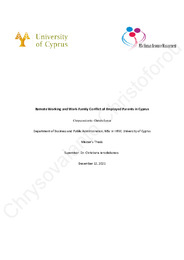| dc.contributor.advisor | Ierodiakonou, Christiana | en |
| dc.contributor.author | Christoforou, Chrysovalanto | en |
| dc.coverage.spatial | Cyprus | en |
| dc.creator | Christoforou, Chrysovalanto | en |
| dc.date.accessioned | 2022-04-05T10:02:06Z | |
| dc.date.available | 2022-04-05T10:02:06Z | |
| dc.date.issued | 2021-12-12 | |
| dc.identifier.uri | http://gnosis.library.ucy.ac.cy/handle/7/65137 | en |
| dc.description.abstract | This study examines the impact of remote working on the work-family conflict of Cypriot parents. Remote working has been endorsed for years as one of the organizational policies that can provide employees with the opportunity to balance their work and life domains. However, it is not always clear how this relationship is affected by other factors. For the purposes of this thesis, I relied on academic resources, journals and articles in order to develop a holistic view regarding the topic. Based on that, the thesis explores remote working in relation to four dimensions of work-family conflict: namely the time-based work interference with family (WIF), time-based family interference with work (FIW), strain-based work interference with family (WIF) and strain-based family interference with work (FIW). Furthermore, it investigates how and whether the different groups of remote working parents experience work-family conflict. A questionnaire was used to collect data from a total of 105 Cypriot remote working parents who participated in this study. Participants were asked to report their work-family conflict in relation to their remote work experience. The findings of this study revealed a positive association between parents’ work-family conflict and remote work. Specifically, the results showed association between mothers with the feelings of anxiety and depression while working remotely as well as with higher levels of strain-based FIW. Moreover, parents with children at the ages between three to five years old are more likely to experience time-based FIW and strain-based FIW while parents with children at school age are inclined to experience more strain based FIW. Parents who worked remotely because of COVID-19 lockdown restrictions do not want to continue working remotely or they want to do it occasionally while as the higher the frequency of remote work is, the higher is the strain-based WIF. Finally, constant use of information technology while working remotely increases the possibilities of parents to experience work- to-family conflict. | en |
| dc.language.iso | eng | en |
| dc.publisher | Πανεπιστήμιο Κύπρου, Σχολή Οικονομικών Επιστημών και Διοίκησης / University of Cyprus, Faculty of Economics and Management | |
| dc.rights | info:eu-repo/semantics/openAccess | en |
| dc.rights | Open Access | en |
| dc.title | Remote working and work-family conflict of employed parents in Cyprus | en |
| dc.type | info:eu-repo/semantics/masterThesis | en |
| dc.contributor.committeemember | Ierodiakonou, Christiana | en |
| dc.contributor.department | Τμήμα Διοίκησης Επιχειρήσεων και Δημόσιας Διοίκησης / Department of Business and Public Administration | |
| dc.subject.uncontrolledterm | ΣΥΓΚΡΟΥΣΗ ΕΠΑΓΓΕΛΜΑΤΙΚΗΣ ΚΑΙ ΠΡΟΣΩΠΙΚΗΣ ΖΩΗΣ | el |
| dc.subject.uncontrolledterm | ΟΙΚΟΓΕΝΕΙΑ | el |
| dc.subject.uncontrolledterm | REMOTE WORKING | en |
| dc.subject.uncontrolledterm | WORK-FAMILY CONFLICT | en |
| dc.subject.uncontrolledterm | PARENTS - ΕΞ ΑΠΟΣΤΑΣΕΩΣ ΕΡΓΑΣΙΑ | en |
| dc.author.faculty | Σχολή Οικονομικών Επιστημών και Διοίκησης / Faculty of Economics and Management | |
| dc.author.department | Τμήμα Διοίκησης Επιχειρήσεων και Δημόσιας Διοίκησης / Department of Business and Public Administration | |
| dc.type.uhtype | Master Thesis | en |
| dc.contributor.orcid | Ierodiakonou, Christiana [0000-0002-3403-5282] | |
| dc.gnosis.orcid | 0000-0002-3403-5282 | |

